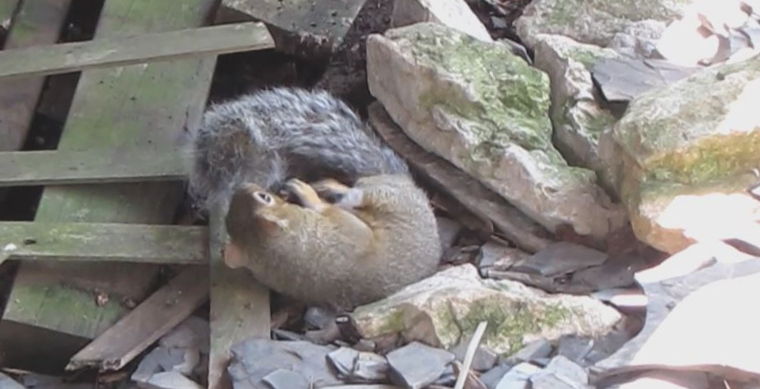-
info@aaanimalcontrol.com
Call us for help in your town
Humane Wildlife Education
I Have a Squirrel Under My Porch … What Should I Do About It?
I Have a Squirrel Under My Porch … What Should I Do About It?
Need squirrel removal in your hometown? We service over 500 USA locations! Click here to hire us in your town and check prices- updated for year 2020.
Firstly, we're super sorry to burst your bubble, but there's a REALLY BIG CHANCE that you don't have just the one squirrel living under your porch; it is more than likely a small family of them. In almost all cases, squirrels that have invaded human territories have done so to find a nest — a mother with her young.

Secondly, you actually have a couple of options to pick from when figuring out what to do next. They are:
1 - Do nothing.
You could do this; mother squirrels are known to carry their young from one nesting spot to another after a while, usually when they think the original spot is no longer safe. The family is also likely to leave the nest when the youngsters are old enough to fend for themselves, usually about You can actually hurry this process along … bringing us to option number 2.
2 - Use wildlife eviction fluid.
This is actually a pretty great option to use for a number of animals that you may find camping out under your porch, but, like most other wild animal control methods, isn't 100% guaranteed to work. Wildlife eviction fluid can be used to mimic the scent of predators. If a mother thinks that predators are hanging around, she will move her family to a safer spot.
3 - Trap the beast.
Again, if you have more than one squirrel — a mother with her young — trying to trap them might be a bit of a nightmare. How are you going to get them all in the same trap? Even if you were to use a trap that had been attached to the entrance/exit hole on the building, you can't be sure that you'll get the entire family. What happens if the young aren't yet old enough to leave the nest? They'll be stuck inside and the mother will be stuck in the trap. She'll be raging mad about it too.
Trapping only works when you have one animal ALONE, or if you can get to the babies first. In some cases, you can grab the babies, pop them into a large enough trap to contain them all, and lure the mother in right after them. It's not a process that works every time, but it can work. Many wild animal mothers will do whatever they need to do to ensure the safety of their brand new furry little family.
4 - Exclude them instead.
If you don't want to intervene too much, you could always look at exclusion devices, which can be made (funnels) or purchased (one-way door ‘traps'). Again, just as with traps, you will want to make sure you're taking the right approach — baby squirrels are probably going to be too young to use the exclusion device for a while, which leaves you with a mother outside and a nest of babies inside.
5 - Do nothing.
You could do nothing … it works probably about 1% of the time. When the youngsters are old enough to leave the nest, the entire family might just leave of its own accord. The problem with that … squirrels can have two litters in one year. Once the original family is old enough to leave, a secondary family might be waiting in the wings. These critters do not hang around.
6 - Call in the experts.
City and county animal services probably won't be able to help, although, they might try. Your landlord should help if you live in a rented building, although, he might want to do the trapping business himself. This is something that the two of you will need to work out together.
The experts, in this case, aren't the police or fire department, or even the local animal services. We don't even recommend calling in a company with “pest control” in the title. Squirrels are a little big to class as pests — it's a name usually reserved for smaller critter; ones that are easily sent packing with the help of a little fumigation.
Wild animal removal operatives, wildlife rehabilitators, wild animal control … They're known by a few different names, but they're the superheroes of this particular situation. With the right tools for the job, the right experience to know what might just happen next, and all the training (and licenses) you could ever need, they're called the experts for a reason.


















